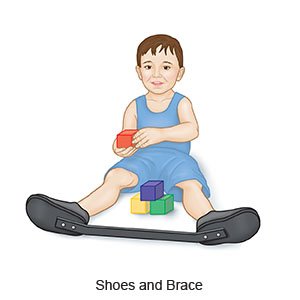Clubfoot
Medically reviewed by Drugs.com. Last updated on May 6, 2024.
What is clubfoot?
Clubfoot is a congenital condition that causes your baby's foot to point down and be turned inward. The tendons in your baby's leg and foot are shorter and tighter than average. This causes the foot to be pulled into an incorrect position. One or both feet may be affected. Clubfoot can range from mild to severe.
What increases my baby's risk for clubfoot?
- A family history of clubfoot
- Being male
- Having another congenital condition, such as spina bifida
- Not enough amniotic fluid during pregnancy
- Cigarette smoking or drug use by his or her mother during pregnancy
What are the signs of clubfoot?
- Toes point down or toward the opposite foot
- Foot turned upside down (severe clubfoot)
- A deep crease on the bottom of the foot
- Foot stiffness
- Foot joints that do not move correctly
- Smaller foot, heel, or calf muscles compared with other children his or her age
How is clubfoot diagnosed and treated?
Your baby's healthcare provider may be able to see the clubfoot on an ultrasound before your baby is born. X-rays may be used to find specific bone problems and help plan treatment. Your baby may need any of the following, depending on how severe the clubfoot is:
- Stretching and casting means stretching the foot toward the correct position and applying a cast to hold the position. The cast will go from your baby's foot to his or her upper thigh. One or 2 times a week, the cast will be removed so the foot can be moved closer to the correct position. A new cast will be applied each time. This will continue for 6 to 8 weeks. Your baby's provider may cut the Achilles tendon, or heel cord, before the final cast is applied. This helps the tendon grow longer before the cast comes off. Ask for information on cast care and safety.
- Stretching, taping, and splinting may start soon after your baby is born. Your baby's provider will stretch your baby's foot toward the correct position. He or she will tape and splint the foot to hold it in the correct position. This will continue each day for 2 months. Then it will be done less often until your baby is 6 months old. Stretching and splinting at night will continue until your baby starts to walk.
- Surgery may be needed if other treatments do not work or if your baby's clubfoot is severe. Surgery is used to make the heel cord longer, and to fix other foot problems. Your baby will be in a cast for 6 to 8 weeks after surgery. Surgery may not fix clubfoot completely, but it can help improve your baby's ability to walk.
What can I do to manage clubfoot?
Help your baby do stretching exercises provided by his or her provider. After casting, splinting, or surgery, your baby may also need to wear a brace for 3 to 4 years. A brace is a pair of shoes connected to a metal bar. Your baby will wear the brace for 23 hours every day for 3 months. The hour it is off is for when you bathe your baby. Your baby's provider may also recommend other activities he or she can do while the brace is off. Your baby will transition to wearing the brace when he or she sleeps at night and during naps. It can be difficult to make sure your baby wears the brace, but it is important so clubfoot does not return. The following can help make it easier to stay with the routine:
- Encourage your baby to walk and play in the brace. The way your baby walks will depend on the kind of brace he or she has. Some braces have bars that bend as the baby walks. You may be able to move his or her legs up and down to help him or her get used to the motion. Other braces have solid bars that do not move. You may be able to help by pushing and pulling on the bar to make your baby's legs bend and straighten. Your baby may adjust to wearing a brace more easily if you play with him or her while he or she wears it.

- Create a brace routine. Tell your baby when it is time to put on the brace. Make it a regular part of getting ready for overnight sleep and naps. The brace may prevent your baby from sleeping well. Talk to his or her provider if you notice your baby is fussy or irritable from not getting enough sleep.
- Make your baby's foot comfortable. Check that his or her heel is all the way down in the shoe. Tighten the straps to make sure the heel does not slide. Your baby may have some redness at first from the shoes. Do not put lotion on your baby's feet. Lotion will make your baby's foot slide in the shoe. Check his or her foot a few times every day for blisters, sores, and redness. These may mean his or her heel is sliding in the shoe.
- Prevent your baby from getting out of the brace. Check that the straps and laces are tightly secured. It may help to have your baby wear 2 pairs of socks or to use socks with nonslip soles. You can also try removing the tongue of the shoe. You can make the laces harder to loosen by lacing the shoe from top to bottom.
- Make the brace safe. Put a pad on the metal bar. This will help protect your baby and anyone who is caring for him or her. It will also help protect furniture as your baby walks. Ask your baby's provider how to pad the bar and what to use for padding.
How can I prevent clubfoot in a future pregnancy?
Clubfoot often has no clear cause to prevent, but you can lower your baby's risk. Do not smoke cigarettes or take drugs while you are pregnant. To prevent other congenital conditions that may lead to clubfoot, take a prenatal vitamin. Start taking it at least 1 month before you get pregnant. Continue as directed through the first trimester. Look for prenatal vitamins that have at least 400 micrograms of folic acid. Folic acid helps prevent certain congenital conditions.
 |
When should I call my baby's doctor?
- You have questions or concerns about your baby's condition or care.
Care Agreement
You have the right to help plan your baby's care. Learn about your baby's health condition and how it may be treated. Discuss treatment options with your baby's healthcare providers to decide what care you want for your baby. The above information is an educational aid only. It is not intended as medical advice for individual conditions or treatments. Talk to your doctor, nurse or pharmacist before following any medical regimen to see if it is safe and effective for you.© Copyright Merative 2024 Information is for End User's use only and may not be sold, redistributed or otherwise used for commercial purposes.
Further information
Always consult your healthcare provider to ensure the information displayed on this page applies to your personal circumstances.
